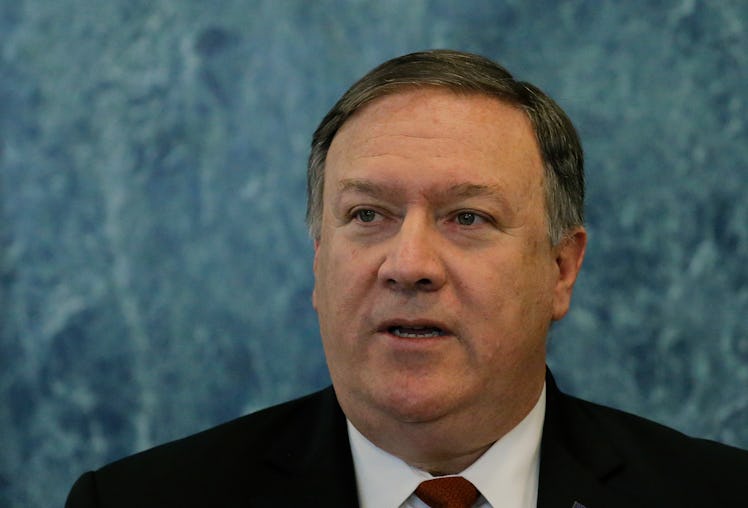
The Trump Admin Reportedly Might Get Rid Of The Office For Refugees, & Just, Ugh
While the discussion over the United States' involvement in the world refugee crisis has become more heated, reports say that Secretary of State Mike Pompeo might get rid of the office for refugees. If the public thought that President Donald Trump's administration wasn't doing enough for refugees — as of April, the U.S. had only let in 11 Syrian refugees, according to NPR — this will surely not help. What great timing.
According to Politico, even U.S. officials are urging Pompeo to keep the State Department's Bureau of Population, Refugees, and Migration open. In a letter obtained by Politico sent to to Pompeo and leaders of Congress on Monday, July 23, 43 former government officials — who served for both Democrat and Republican administrations — and humanitarian organization heads urged Pompeo to keep the State Department's Bureau of Population, Refugees, and Migration operating. One anonymous official who signed the letter told Politico that the letter was in response to fears that Pompeo was revisiting the decision made by former Secretary of State Rex Tillerson not to cut the bureau, and should be making a decision soon on the bureau's future.
Elite Daily reached out to the State Department for comment on the office's future and any potential plans to cut it, but did not immediately hear back.
The Bureau of Population, Refugees, and Migration office is part of the State Department and committed to providing "protection and ease of suffering" to refugees, other migrants, and conflict victims, according to their mission statement. The office helps either settle these people in the countries they've fled to, resettle them in a different place, or help them go home when there's no longer a risk. The Bureau also works with and contributes to international organizations like the United Nations and non-governmental organizations that aid refugees.
The Trump administration doesn't have the best track record on refugees right now. As of the first quarter of 2018, the administration had resettled only 6,704 refugees, as compared to more than 25,000 in 2017, according to Politico, and the administration's screening process for refugees from certain areas has been criticized as making it harder for Muslims to find asylum in the United States, per The New York Times. And in June, Attorney General Jeff Sessions even tightened restrictions on who is eligible for asylum in the United States, barring those fleeing domestic abuse or gang violence from claiming asylum.
Monday's letter to Pompeo highlights the feeling that closing the bureau would be "an error of grave proportion," according to Politico. It reads,
We are deeply concerned by recent reports that the Bureau may be eliminated. We believe this would be an error of grave proportion, and we would urge close consultation with the U.S. Congress before such a critically important measure is even considered.
The news that Pompeo is reportedly thinking of reversing Tillerson's decision to keep the bureau open is a little confusing given his comments on World Refugee Day. In a June 20 press statement, Pompeo said "global displacement has reached record levels — " it's at about 68.5 million people worldwide — and that governments as well as "international financial institutions" and private businesses and individuals should help with the global response. Pompeo added that the United States would be at the helm and a leader in "humanitarian assistance," according to the State Department. He wrote,
As global displacement has reached record levels, it is vital that new actors — including governments, international financial institutions, and the private sector – come to the table to assist in the global response to address it. The United States will continue to be a world leader in providing humanitarian assistance and working to forge political solutions to the underlying conflicts that drive displacement.
Wouldn't closing the Bureau of Population, Refugees, and Migration hinder the nation's ability to help relieve global displacement? If Pompeo will actually move towards cutting the bureau it seems like a little bit of a contradiction, and will definitely not put the U.S. in a position of leadership when it comes to "providing humanitarian assistance." I guess we'll see how it plays out.